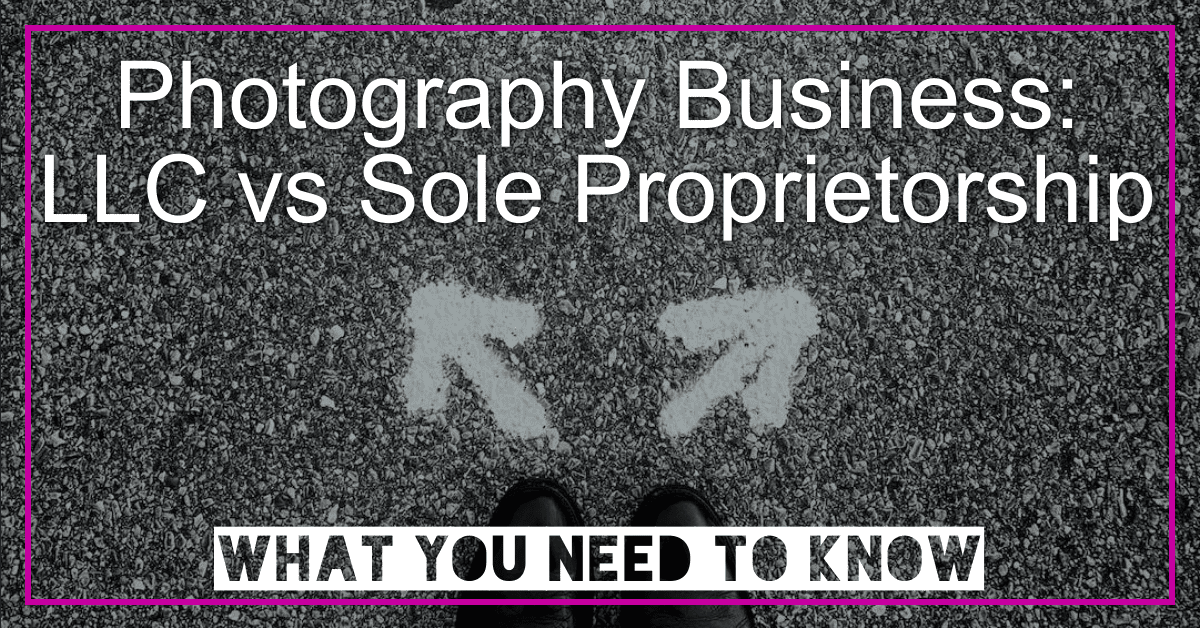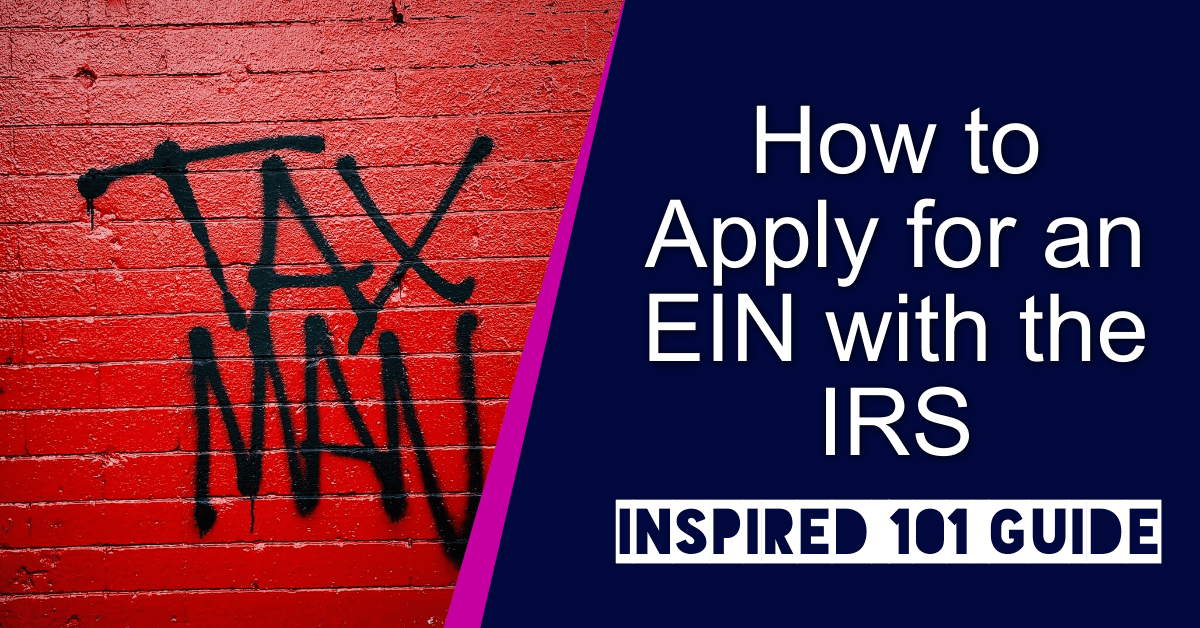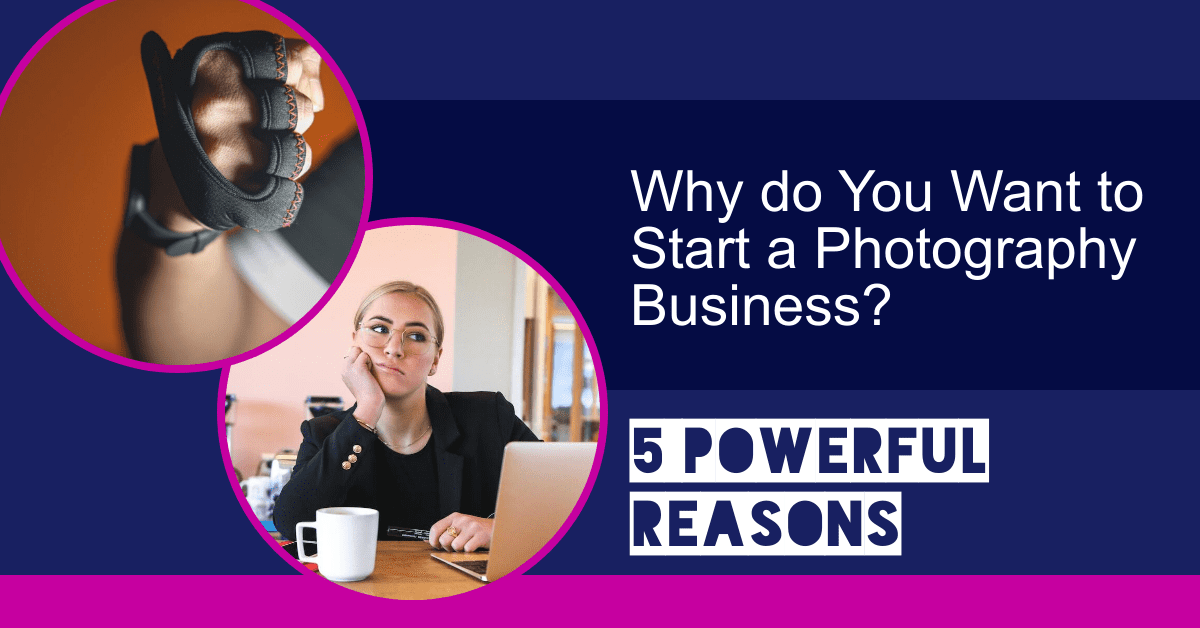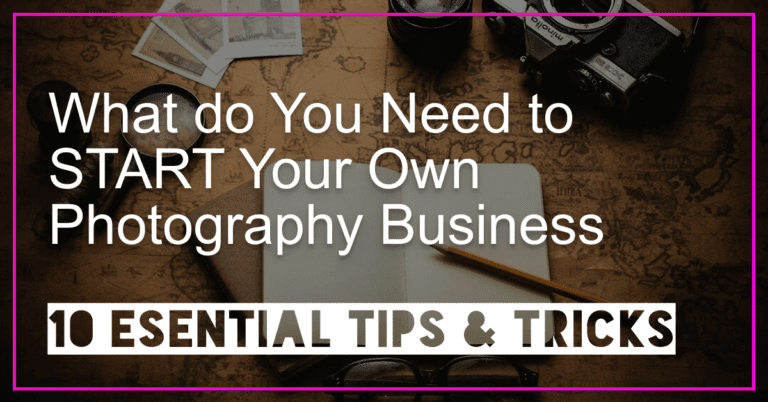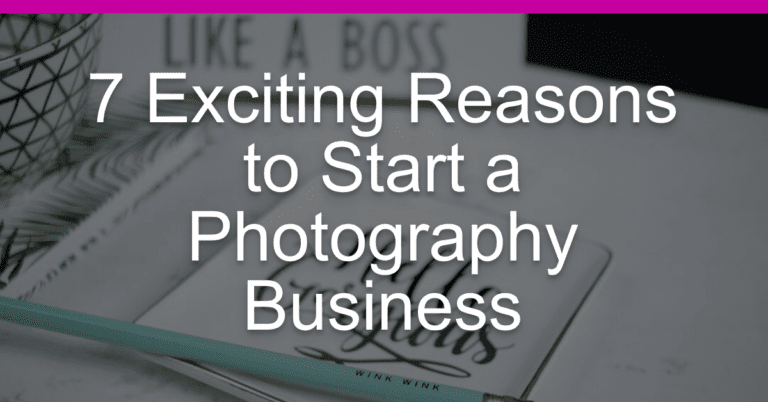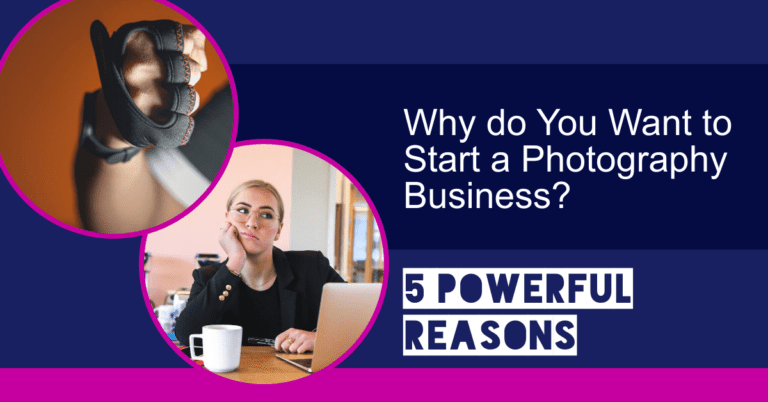When starting a Photography Business LLC or Sole Proprietorship, one of the most crucial decisions you’ll have to make is selecting the appropriate legal structure.
Your choice of legal structure will significantly impact how your business functions, including tax implications, ownership, and management. Therefore, it’s essential to carefully consider the benefits and drawbacks of each legal structure before making a decision.
Choosing the proper legal structure for your photography business cannot be overstated. Different legal structures offer different benefits and drawbacks, and it’s essential to understand these implications before deciding.
For example, choosing the wrong legal structure can lead to higher taxes, increased personal liability, and difficulty raising capital. On the other hand, selecting the proper legal structure can help protect your assets, simplify tax reporting, and provide flexibility in ownership and management.
This post will compare and contrast two common legal structures on Photography Business LLC or Sole Proprietorship.
It will provide an in-depth explanation of each legal structure, including the advantages and disadvantages of each, and provide examples of how each can impact your photography business.
By the end of this post, you should better understand which legal structure is best suited when starting your Photography Business LLC or Sole Proprietorship.
Table of Contents
Photography Business LLC or Sole Proprietorship: Background Information
LLC and Sole Proprietorship:
Photography Business LLC or Sole Proprietorship companies are two common legal structures that entrepreneurs can use to start and manage a business.
A Limited Liability Company (LLC) is a type of legal structure that provides personal liability protection to its owners or members. It separates personal assets from business assets, meaning that if the business is sued or goes bankrupt, the owner’s personal assets are not at risk. LLCs also have the benefit of pass-through taxation, which allows business income and losses to be reported on the owner’s personal tax return.
A sole proprietorship, on the other hand, is a type of business that is owned and operated by a single individual. It is the simplest and most common form of business ownership. In a sole proprietorship, the owner is personally responsible for all aspects of the business, including debts and legal issues.
How These Legal Structures Came Into Existence
The concept of a sole proprietorship has been around for centuries, as individuals have always had the ability to start and operate their own businesses.
LLCs, however, are a more recent development, and were first introduced in the United States in the late 1970s. The purpose of the LLC was to create a new type of business structure that combined the benefits of both partnerships and corporations.
The idea behind the LLC was to provide entrepreneurs with the flexibility and tax benefits of a partnership, while also offering the personal liability protection of a corporation.
Since then, LLCs have become increasingly popular among small business owners and entrepreneurs, particularly in the photography industry.
The Popularity of LLCs and Sole Proprietorships in the Photography Industry
When looking at Photography Business LLC or Sole Proprietorship within the photography industry, they are both popular legal structures for small businesses.
According to a survey conducted by Professional Photographers of America, LLCs are the most common legal structure among photography businesses, with 42% of respondents indicating that they have formed an LLC.
Sole proprietorships were the second most popular legal structure, with 35% of respondents using this form of business ownership.
The popularity of LLCs and sole proprietorships in the photography industry can be attributed to several factors, including the ease of formation and the personal liability protection they offer.
Additionally, these legal structures offer flexibility in terms of taxation, allowing business owners to choose the most advantageous tax structure for their needs.
Overall, the choice between a Photography Business LLC or Sole Proprietorship ultimately depends on the unique circumstances of each individual type of photography business.
LLC's for Photography Business
Benefits of Forming an LLC for a Photography Business
Limited Liability Companies (LLCs) are a famous legal structure among photography businesses due to their numerous benefits.
The primary benefit of forming an LLC for your photography business is personal asset protection. You may face liability risks such as equipment damage, client injury, or copyright infringement claims as a photographer.
An LLC separates your assets from your business assets, providing protection for your finances in case of a lawsuit. Additionally, LLCs offer flexibility in ownership and management, allowing multiple owners or managers to run the business.
Steps to Form an LLC for a Photography Business
Forming an LLC for your photography business involves several steps.
- First, you need to choose a name for your LLC and check if it’s available in your state.
- Then, you’ll need to file articles of organization with your state’s Secretary of State and pay the required fees.
- You may also need to obtain any necessary permits or licenses for your photography business.
- Once your LLC is formed, you’ll need to create an operating agreement, which outlines your business’s ownership and management structure.
Photography Businesses that have Formed LLCs
Many photography businesses have successfully formed LLCs to take advantage of the abovementioned benefits.
For example, Tom Bol Photography LLC is a photography business that specializes in capturing outdoor adventure sports. They formed an LLC to protect their assets from liability risks associated with extreme sports photography.
Another example is Sandra Coan Photography LLC, which provides photography services for families and children. Sandra Coan formed an LLC to protect her assets from potential lawsuits and provide flexibility in ownership and management structure.
Sole Proprietorship for Photography Business
Benefits of Operating as a Sole Proprietorship for a Photography Business
Sole proprietorships are another famous legal structure for photography businesses, particularly for solo photographers who want a simple and low-cost business setup.
One of the main benefits of operating as a sole proprietorship is that it’s the easiest and least expensive way to start a business. You don’t have to file any formation documents with the state, and no ongoing filing fees exist.
As a sole proprietor, you have complete control over your business and don’t have to share profits or decision-making with any partners.
Steps to Operate as a Sole Proprietorship for a Photography Business
Operating as a sole proprietorship for your photography business involves fewer steps than forming an LLC.
- First, you must register your business name and obtain any necessary permits or licenses in your state or local government.
- Then, you’ll need to obtain a tax identification number from the IRS and register for any applicable state or local taxes.
- Finally, you’ll need to keep accurate records of your income and expenses for tax purposes.
Photography Businesses that Operate as Sole Proprietorships
Many successful photography businesses operate as sole proprietorships.
For example, Jasmine Star Photography is a fashion and lifestyle photography business that operates as a sole proprietorship. Jasmine Star started her business as a solo photographer and operated as a sole proprietor to keep things simple and have complete control over her business.
Another example is Jana Williams Photography, a wedding photography business that operates as a sole proprietorship. Jana Williams chose this legal structure because it’s easy to set up and doesn’t require sharing profits or decision-making with partners.
Comparison and Contrast of LLCs and Sole Proprietorships
Tax Implications
The tax implications are among the most significant differences between a Photography Business LLC or Sole Proprietorship. LLCs can be taxed as either a pass-through entity or a corporation.
- Pass-Through: As a pass-through entity, the LLC’s profits and losses pass through to the individual owner’s personal tax returns, which are taxed at their tax rates.
- Corporation: If the LLC chooses to be taxed as a corporation, the company is subject to corporate taxes, and the owners pay taxes on any dividends they receive.
On the other hand, sole proprietorships are also pass-through entities, and the business owner reports all profits and losses on their tax return, paying taxes at their tax rate.
Liability Implications
The liability implications are another essential consideration for photography businesses when choosing between a Photography Business LLC or Sole Proprietorship.
An LLC offers personal liability protection to its owners, meaning that the owners are not personally liable for the company’s debts or legal judgments against the company. This means a photographer’s assets, such as their home or car, are protected from business-related lawsuits.
On the other hand, sole proprietors have unlimited personal liability for their business’s debts and legal judgments. If a photographer is sued, their personal assets could be at risk.
Ownership Implications
Ownership implications are also essential when choosing between a Photography Business LLC or Sole Proprietorship.
- LLCs can have multiple owners, and each owner can have a specific percentage of ownership in the company. This allows for flexibility in how the business is managed and operated.
- However, sole proprietorships are owned entirely by one person and have complete control over the business’s operations and management.
Choosing the Right Legal Structure for Your Photography Business
Factors when choosing LLC and Sole Proprietorship:
- Liability: Consider the level of risk associated with your photography business. If you operate in a high-risk area, such as adventure photography, then an LLC may provide better protection against personal liability.
- Taxes: Consider the tax implications of each legal structure. While LLCs offer more flexibility in taxation, sole proprietorships may be more advantageous if you start and have lower revenue.
- Management: Consider how you want to manage your photography business. An LLC may be a better choice if you want to have a more formal management structure with multiple owners.
Tips for Making an Informed Decision:
- Research: Conduct thorough research on the legal structures available for your photography business.
- Seek Professional Advice: Consult with a lawyer and accountant to determine which legal structure best suits your business needs.
- Understand the Requirements: Understand the requirements and obligations associated with each legal structure. This includes fees, taxes, and paperwork.
Choosing the Right Legal Structure:
- John Smith Photography: John Smith has a successful product photography business and formed an LLC to protect his assets from potential lawsuits.
- Michael Wilkinson Photography: Michael Wilkinson is a wedding photographer who operates as a sole proprietorship. This legal structure allows Michael greater control over her business and simplifies tax filing.
- Sarah E Photography: Sarah Yarbrough runs a multi service photography business registered as an LLC to provide a more formal management structure and to limit their liability.
Conclusion: Photography Business LLC and Sole Proprietorship
In conclusion, the legal structure you choose for your photography business will significantly impact its success. Photography Business LLC or Sole Proprietorship companies have advantages and disadvantages, and it’s essential to carefully consider your options before deciding.
Forming an LLC can provide more protection against personal liability, while a sole proprietorship may offer more flexibility and simplicity regarding taxation and management.
When choosing the proper legal structure, there are several factors to consider, such as your business goals, financial situation, and risk tolerance. It’s essential to research, seek advice from legal professionals and other photographers, and make an informed decision that aligns with your needs and objectives.
We encourage you to take the time to explore your options and make the right decision for your photography business. Whether you choose a Photography Business LLC or Sole Proprietorship, remember that your legal structure will play a crucial role in determining the success and longevity of your business.


Gideon van Niekerk
Photographer & Blogger
Transform Your Passion for Photography into a Thriving Career! As a professional photographer with over a decade of experience, I share the secrets of building a successful photography business on my blog. Unlock the Secrets to Starting a Profitable Photography Business Today! Join me on an incredible journey of discovery, where you’ll learn insider tips and tricks to building a successful photography empire. Don’t miss out on this exciting opportunity to turn your passion into profit – let’s embark on this journey together!


